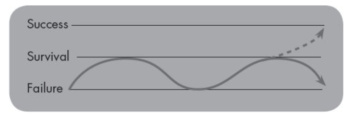If you’re into sports, you’re surely keen on forming new habits to improve your overall wellbeing, but many times procrastination stands in the way.
I wrote an article earlier about fine-tuning yourself, and small tweaks here and there are probably quite easy to incorporate in your daily life; however, more significant changes might be harder to kick off. So what happens? We procrastinate. Over and over again.
First of all, why do we procrastinate? From what I gather, it’s all about the instant reward—the little rush of dopamine. That would explain why it’s so easy to make plans in your head; to tell yourself ‘I’ll start tomorrow’. Because at that very moment when you decide to change something or start a new habit, you get an instant reward. A positive feeling of having done a good thing for yourself – only by deciding to go ahead with your plans. Then tomorrow comes, and you remember that today is the day when you have to get out of bed and go for that jog you promised yourself the day before. We are fully aware that postponing once again is easy to do – but keep in mind – the anxiety and guilt of continuously postponing are far worse than actually doing the work.
Time inconsistency
We know that the reward of adding a positive change or habit in our life will eventually come; the daily habit of choosing a salad before a donut will pay off by us not being overweight in the future. But the donut is right in front of you, and it’s not going to make a difference today. Well, you know what I’m getting at. Eventually, the daily donut will make a difference. And not in a good way.
“Time inconsistency refers to the tendency of the human brain to value immediate rewards more highly than future rewards” – and that’s what we need to become better at—understanding and appreciating long term rewards.
Ok, so let’s say we’ve had enough of procrastinating. We are finally going to go against our present self and push ourselves to wake up and start jogging every morning because we know it will benefit us in the long run. How do we make it a habit that lasts longer than two or three days?
2-minute rule
I found the ‘2-minute rule’ by James Clear helpful – it’s easy, straight forward, and applicable to everything.
It’s all about understanding that we want to become the person we so vividly see ourselves as in the future. We want to be that person now. Therefore we need to start acting like that person, and we can do it by taking baby steps;
“You’ll find that nearly any habit can be scaled down into a two-minute version:” – James Clear
“Read before bed each night” becomes “Read one page.”
“Do thirty minutes of yoga” becomes “Take out my yoga mat.”
“Study for class” becomes “Open my notes.”
“Fold the laundry” becomes “Fold one pair of socks.”
“Run three miles” becomes “Tie my running shoes.”
The idea is not to keep doing things for 2 minutes (obviously); it’s merely the gateway to your new habit. You keep taking baby steps until it comes naturally, and then you gradually add to your routine.
Once you’ve gotten into the routine, I would recommend reading the book ‘The Slight Edge‘ by Jeff Olson. It’s basically down to the same thing; you know what the right choice (and decision) is to create a better/faster/healthier you – now it’s a matter of sticking to it!
The curve shows what typically happens to all of us. We go from failure (or, let’s call it a non-existing habit), work our way up to survival (let’s call it a newly formed habit), and right there, we get a sense of having mastered something or having ‘made it,’ so we relax. Or slow down.
Guess what happens? We go back to square one and wonder what the hell happened?
That’s when some people say they’re not strong enough or capable enough – “the diet didn’t work” – But it’s not a matter of figuring out what more to do. It’s a matter of keep doing what you did – what got you from failure to survival in the first place. Just keep going, and that will take you to success!















